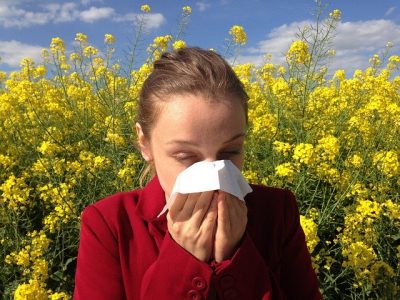St. Louis is among the top 10 worst cities for allergies, so you are likely no stranger to experiencing any or all of the above scenarios and more every day of the year – especially when those seasonal allergies flare up. Learn how to stop allergies with our quick clean air guide for your home and business.
Combating Environmental Allergies

Do you suffer from allergies? Do you have a constant stuffy nose, itchy eyes, or dry skin? Do you hear your asthmatic coworker wheezing through the workday five days a week?
The National Institutes of Health’s monthly newsletter News in Health says, “Allergies arise when the body’s immune system overreacts to substances, called allergens, that are normally harmless… Allergy is one of the most common long-term health conditions” with airborne allergies affecting “approximately 10-30% of adults and 40% of children.”

Identifying Seasonal Allergy Symptoms
According to medlineplus.gov, “allergies can cause a variety of symptoms such as a runny nose, sneezing, itching, rashes, swelling, or asthma.” They can be minor to severe (i.e. anaphylaxis) and can be caused by both genetic and environmental factors. Allergies can be diagnosed by a doctor using skin and blood tests and treated with medicines, shots, and avoidance of the triggers whenever possible.
Natural Remedies for Allergies

There are a number of natural remedies you can employ for relieving the most common allergies.
- Invest in indoor plants (ex: Boston Fern, Bamboo Palm, English Ivy, or a Peace Lily), one for every 100 square feet of home space to increase the Indoor Air Quality (IAQ) per a NASA Clean Air Study
- Avoid the allergen whenever possible
- Pay attention to when and where you notice symptoms, then visit your doctor/allergist, share your notes, and get allergy tests done for a proper diagnosis
- Keep humidity levels low in your home and offices to control dust mites and mold growth
- Avoid upholstered furniture and carpets that collect allergens
- Wash bedding in hot water
- Vacuum once a week
- Make your own cleaning supplies to avoid harmful chemicals

How to Treat Allergies with Indoor Air Quality
Studies from the Environmental Protection Agency (EPA) report that indoor air pollution levels can be 2 to 5 times higher than outdoors. You can improve IAQ with the following services and solutions:
- Air Cleaners can remove 95% of the dust, pollen and mold spores, and bacteria in your St Louis home as well as reduce your allergy symptoms and doctor visits
- Air Scrubbers clean the air and surfaces of 80% of the germs, bacteria, and viruses
- Clean Air Ducts every 3 to 5 years, when moving into a new home, or after building or remodeling a home as recommended by the National Air Duct Cleaners Association
- Humidifiers either portable or whole-home that help solve problems such as dry skin and sinus pain. You can also put water basins near your heating system for a DIY humidifier for allergies.
- Mayo Clinic suggests running the A/C in your home and vehicles to avoid outside allergens and asthma triggers as much as possible.
- Health.com has a number of additional recommendations that can be found in this video.
Additional Resources for Seasonal Allergies
Improving the air quality in your home isn’t just for the benefit of your health and wellness but for your pets’ as well. Good IAQ helps prevent your pups from contracting distemper, which spreads fast and has high mortality rates. Whatever route you choose, setting even one or two of these preventative and cautionary measures into place to improve your IAQ and help stop allergies will help you accomplish your goal.
Use these resources for your allergy and asthma care that tell you the allergy levels today or the allergy forecast today in St. Louis.







